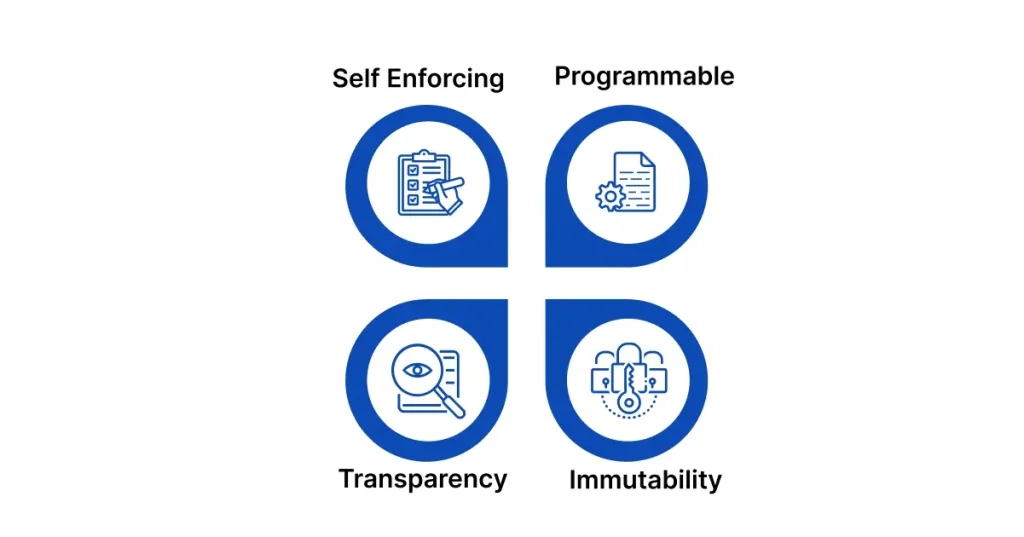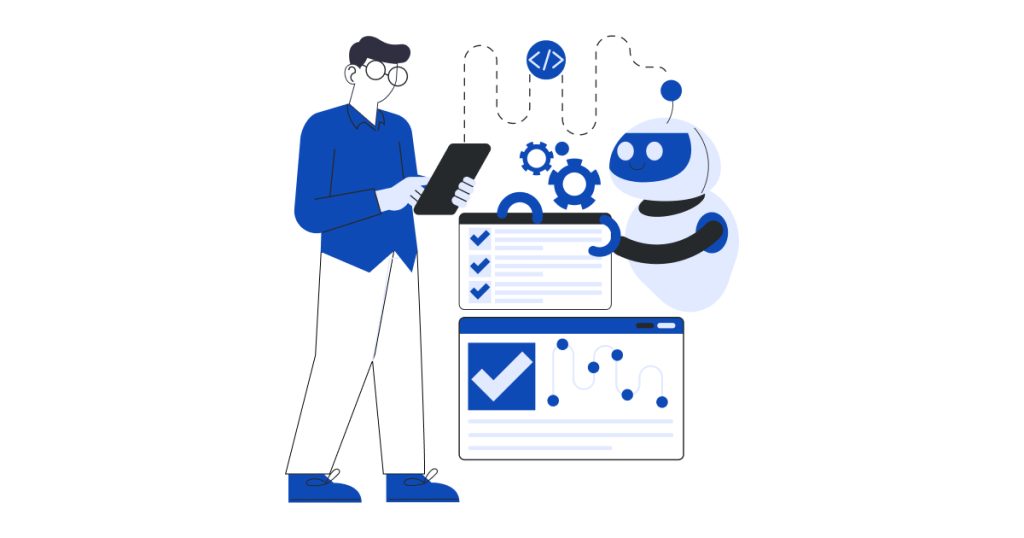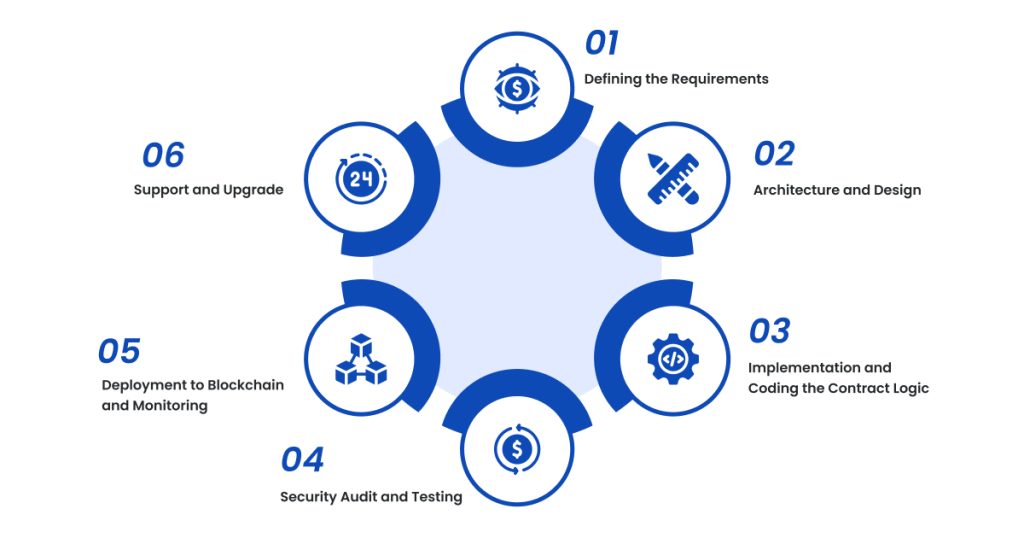The world of cryptocurrency and blockchain technology is brimming with possibilities for enterprising businesses. As an entrepreneur, you’ve likely heard about the revolutionary potential of smart contracts and smart contract development company. But you might be wondering:
- What exactly is a Smart Contract Development Companies, and how can it benefit my business?
- The benefits of smart contracts for business sound great, but how do I actually leverage them?
- Can a blockchain development company help me navigate this new frontier?
If these questions are swirling in your mind, you’re in the right place! This interesting blog will be your one-stop shop for understanding how smart contracts can be the secret weapon that propels your business towards a future of efficiency and security.
We’ll delve into the world of smart contracts, explore the advantages they offer for businesses of all sizes, and most importantly, explain how partnering with a skilled smart contract development company can empower you to capitalize on the exciting opportunities presented by the crypto market.
So, let’s get started to unlock the potential of smart contracts for your business!
What are Smart Contracts and Their Core Features?

Before we dive into how smart contract development companies can empower your business, let’s speak about these powerful smart contracts. Imagine a digital agreement that automatically executes itself when predefined conditions are met. That’s the essence of a smart contract!
These self-contained programs reside on a blockchain, a secure and transparent digital ledger. Here’s what makes them truly revolutionary:
- Self-enforcing: Forget intermediaries and third-party approvals. Smart contracts eliminate the need for manual verification by automatically executing terms once predetermined conditions are fulfilled. This translates to efficiency in business processes by streamlining transactions and saving valuable time.
- Transparency: All actions and data within a smart contract are visible to authorized participants on the blockchain. This fosters trust and eliminates the risk of manipulation, making it a game-changer for building secure and reliable business relationships.
- Immutability: Once deployed on a blockchain, the terms of a smart contract are virtually tamper-proof. This immutability guarantees the integrity of agreements and protects against unauthorized changes, minimizing the risk of fraud and disputes.
- Programmable: Smart contracts are not one-size-fits-all. They can be customized to handle a wide range of complex business logic. This programmability allows you to automate various business transactions, from secure payments and escrow services to loyalty programs and supply chain management.
By harnessing these core features, smart contracts can revolutionize the way you conduct business. Imagine automating business transactions with complete trust and security, all while streamlining processes and saving costs. In the next section, we will learn about the various benefits of smart contracts for business and enterprise functioning.
How Do Smart Contracts Improve Business Efficiency?

We’ve explored the core features of smart contracts, but the true magic lies in the vast array of benefits they offer businesses. These following immense advantages are poised to transform your business operations:
Enhanced Efficiency and Accuracy:
- Efficiency in business processes gets a major boost with smart contracts. Manual tasks and human error are eliminated. This translates to faster processing times, fewer delays, and a significant reduction in operational costs.
Building Trust and Security:
- Transparency: All actions within a smart contract are visible to authorized participants, fostering a secure and transparent environment for conducting business. This builds trust with partners and reduces the risk of fraud.
- Trustless transactions: The decentralized nature of blockchain technology eliminates the need for intermediaries, allowing businesses to conduct secure transactions directly with each other, regardless of location or trust.
- Robust Backup: Data stored on a blockchain is virtually tamper-proof and distributed across a global network, ensuring data integrity and offering a robust backup solution.
Boosting Global Reach:
- Access to Global Markets: The decentralized and borderless nature of blockchain technology allows smart contracts to seamlessly facilitate transactions and agreements between parties across the globe. This opens doors to new markets and eliminates geographical restrictions on conducting business.
- Customizability and Flexibility: Smart contracts can be tailored to meet the specific needs of your business. This property allows you to design solutions for a wide range of applications, from complex financial agreements to loyalty programs and supply chain management.
Additional Advantages:
- Cost Savings: By automating tasks, minimizing errors, and removing intermediaries, smart contracts can greatly reduce all the operational costs.
- High Speed: Transactions facilitated by smart contracts are processed quickly and efficiently, eliminating delays associated with traditional methods.
- Data Storage: Blockchain technology offers a secure and permanent way to store and manage data, improving accessibility and traceability.
- Reliability: Smart contracts operate autonomously based on predefined rules, ensuring consistent and reliable execution of agreements.
Instances of Smart Contract Applications:
The innovative world of smart contracts extends far beyond simple transactions. Here are just a few examples of how they’re revolutionizing various industries:
- NFTs (Non-Fungible Tokens): Smart contracts are used to manage the ownership and transfer of unique digital assets like artwork and collectibles.
- Metaverses: Decentralized virtual worlds leverage smart contracts to govern interactions, manage digital assets, and facilitate secure in-world transactions.
- Decentralized Finance and Decentralized Autonomous Organizations: Smart contracts form the backbone of DeFi platforms, enabling secure peer-to-peer lending, borrowing, and trading without the need for traditional financial institutions. DAOs also utilize smart contracts for transparent and automated governance structures.
- Crowdfunding: Smart contracts can streamline crowdfunding processes, ensuring secure and transparent fundraising campaigns.
These are some good examples of how smart contracts are used to improve business efficiency. From streamlining real estate transactions to securing intellectual property rights, smart contracts are poised to revolutionize the way we conduct business across every industry imaginable.
Smart contract applications range from facilitating basic token transfers to powering complex, decentralized applications that are transforming entire industries.
In the next section, we’ll explore the power of smart contract development for various business use cases in detail.
Real-World Applications of Smart Contracts

We know that the true power of smart contracts lies in their ability to revolutionize the way we conduct business across various industries. Let’s explore some compelling use cases that demonstrate the transformative potential of smart contracts.
1. Financial Services: Reimagining Finance
- Peer-to-Peer Transactions: Imagine a secure and transparent way to send and receive funds directly, without the need for intermediaries. Smart contracts can automate this process, reducing transaction fees and settlement times.
- Trade Clearing: Streamline trade settlements with automated contract execution based on predefined conditions, eliminating delays and errors associated with traditional methods.
- Insurance Claim Processing: Smart contracts can automatically assess claims based on predetermined criteria, expediting payouts and reducing administrative burdens.
- Micro-Insurance and Micro-Lending: Smart contracts can enable the creation of innovative micro-insurance and micro-lending products, extending financial services to previously underserved populations.
- Transparent Auditing: Increase trust and accountability with auditable smart contracts that provide a permanent record of all transactions on the blockchain.
- Escrow Services: Ensure secure and automated escrow services, holding funds in a neutral third-party space until all contractual obligations are met.
2. Healthcare: Streamlining the Medical Landscape
- Electronic Medical Records (EMR): Securely store and manage patient data using smart contracts, ensuring patient privacy and facilitating secure data sharing between authorized healthcare providers.
- Medical Research: Smart contracts can facilitate secure collaboration and data sharing for medical research, accelerating advancements in healthcare.
- Health Insurance: Automate claim processing and reimbursements for health insurance, reducing administrative costs and improving patient experience.
3. Voting: Ushering in a New Era of Democracy
Imagine secure and transparent voting systems powered by blockchain and smart contracts. This could revolutionize democratic processes by eliminating fraud and increasing voter confidence.
4. Media Industry: Empowering Content Creators
Smart contracts can automate royalty payments for artists and musicians, ensuring they receive fair compensation for their work.
5. Supply Chain: Transparency from Source to Shelf
- Payment Transfer: Automate secure and timely payments to suppliers upon delivery of goods, streamlining cash flow within the supply chain.
- Product Provenance: Track the origin and journey of products using smart contracts, ensuring authenticity and combating counterfeiting.
- Inventory Tracking: Gain real-time visibility into inventory levels across the supply chain, optimizing logistics and reducing stockouts.
- Verifying Authenticity: Authenticate products using smart contracts, eliminating the risk of counterfeit goods reaching consumers.
- Triggering Payments Upon Delivery: Automate payment upon successful delivery, eliminating delays and disputes.
6. Real Estate: Simplifying Transactions
Real estate transactions can be streamlined with automated title transfers and secure payments triggered upon completion of contractual obligations.
7. ICOs:
Smart contracts can define the terms of token distribution, manage contributions, and ensure transparency in the entire investment process for Initial Coin Offerings (ICOs). Leveraging an ICO Development Service, these contracts are meticulously crafted to enhance the reliability and security of ICOs, automating crucial processes and fostering investor trust.
8. Intellectual Property and Licensing: Protecting Creativity
- The smart contracts ensure that creators will receive fair compensation for their work with automated royalty payments facilitated by smart contracts.
- Track how copyrighted material is used and ensure creators are properly compensated.
9. Governments: Streamlining Bureaucracy
Government bodies can leverage smart contracts to digitize and automate certain administrative processes, improving efficiency and reducing costs. This technology also holds promise for managing identity systems, especially in countries exploring digital IDs.
10. Entertainment Industry: Powering the Creator Economy
- Royalties Every Time: Artists can leverage smart contracts to ensure they receive royalties every time their work is bought, streamed, or used.
- Tokenization of Assets with NFTs: The rise of Non-Fungible Tokens (NFTs) creates a new way for artists and creators to monetize their work through NFT marketplace development solutions.
11. Gaming: Revolutionizing In-game Economies
Imagine secure ownership of in-game assets and the ability to seamlessly trade them with other players. Smart contracts can power these innovative features within the gaming industry.
12. Legal Sector: Automating Legal Processes
The legal sector can explore using smart contracts for self-executing wills or automating certain legal processes, potentially streamlining workflows and reducing costs.
13. Decentralized Energy Grids: Powering the Future
Smart contracts can enable the creation of decentralized energy grids where individuals can sell excess power they generate back to the grid in a secure and transparent manner.
Imagine a future where your home solar panels can automatically sell excess energy to your neighbor, or where communities can create microgrids powered by renewable energy sources, all facilitated by the trust and automation of smart contracts.
14. Retail Industry: Reimagining Loyalty Programs
The retail industry is also ripe for disruption with smart contracts. Imagine loyalty programs that are automated and tokenized. Customers could earn and spend loyalty tokens redeemable for discounts or exclusive products. This not only streamlines the loyalty program process but also opens doors for innovative customer engagement strategies.
The applications of smart contracts extend far beyond the examples listed here. The potential for smart contracts to revolutionize the way we conduct business across industries is undeniable.
The various benefits of smart contracts for business include increased transparency, streamlined processes, and reduced costs. As smart contract development companies hone their craft and the technology matures, we can expect to see even more innovative use cases emerge, transforming the business landscape as we know it.
If you want to increase transparency in business and improve business efficiency, then hire a smart contract developer with a great reputation. This is the first step towards realizing the transformative potential of smart contracts. In the next section, let’s get into the main working principles of a smart contract.
Understanding How Smart Contracts Work

Now that we’ve explored the benefits of smart contracts, let’s delve into the mechanics that power them. Here’s a breakdown of the key steps involved in a smart contract’s lifecycle:
Deployment:
- Imagine writing a program (the smart contract) that outlines the terms of an agreement.
- With the help of a smart contract development company, this code is then uploaded and permanently stored on a blockchain network.
Interaction:
- Once deployed, the smart contract becomes a self-contained program on the blockchain.
- To initiate the agreement, users interact with the smart contract by sending a transaction that triggers its execution.
Execution:
- Miners verify the transaction and the smart contract’s code.
- If the predefined conditions within the contract are met, the code executes automatically.
Deterministic Nature:
- Smart contracts are deterministic, meaning their outcome is always predictable based on the initial conditions and the code itself.
- This ensures greater transparency in the execution process.
Gas and Fees:
- Think of “gas” as the fuel that powers smart contract execution.
- Every operation within a smart contract requires a certain amount of gas, and users pay a fee in cryptocurrency to cover this cost. A Blockchain cryptocurrency exchange development company can advise on optimizing your smart contract to minimize gas usage and fees.
Accessing External Data:
- While powerful, smart contracts primarily operate on the data stored within themselves.
- To interact with external data sources, more complex smart contract designs called “Oracles” are used. Smart contract development companies can help you determine if an Oracle solution is necessary for your specific use case.
Understanding these core functions is crucial before venturing into the world of smart contracts. But it’s even more important to understand the algorithms and protocols that are integral to these smart contracts. We will cover that in detail in the upcoming section.
What Are The Algorithms Powering Smart Contracts

Smart contracts rely on a complex interplay of algorithms, data structures, and protocols, depending on the specific context. Various algorithms work together under the direction of protocols to achieve a good outcome.
Here are some key players in the same.
1. Consensus Algorithms:
Consensus algorithms are the mechanisms that ensure all participants on a blockchain network agree on the validity of transactions and the current state of the ledger. Popular options include:
- Proof of Work (PoW): The time-tested workhorse, PoW secures the network by requiring miners to solve complex puzzles before adding a block to the chain.
- Proof of Stake (PoS): This energy-efficient alternative selects validators based on their cryptocurrency holdings, incentivizing them to maintain network integrity.
- Delegated Proof of Stake (DPoS): A variation of PoS, DPoS allows token holders to elect delegates who validate transactions.
The choice of consensus algorithm significantly impacts factors like transaction speed, energy consumption, and network security. Every Blockchain development company can advise you on the most suitable option for your specific smart contract application.
2. Cryptography Algorithms:
Robust cryptography is the lifeblood of any secure system, and smart contracts are no exception. Here are two critical cryptographic algorithms at play:
- Elliptic Curve Digital Signature Algorithm (ECDSA): This efficient algorithm allows users to cryptographically sign transactions, ensuring their authenticity and preventing unauthorized modifications.
- Hashing Functions (SHA-256 and Keccak): These one-way functions take data and generate a unique fingerprint (hash). Any change to the data results in a completely different hash, making it virtually impossible to tamper with information stored on the blockchain.
3. Execution Protocols, Self-Executing Functions, and Token Standards:
These components work together to define how smart contracts interact with the blockchain and execute their programmed logic. Smart contract development companies specialize in crafting secure and efficient implementations tailored to your specific needs.
The Right Tool for the Job
While all these algorithms and protocols play a vital role in the world of blockchain and smart contracts, the specific combination used depends on the smart contract’s purpose and function. A smart contract for a Decentralized Exchange Development(crypto exchange development) might require a complex set of algorithms to handle secure trading and token management, while one for managing identity or holding funds in escrow might leverage a more streamlined approach.
A skilled smart contract development company can help you navigate this technical landscape and ensure your smart contracts are built with the optimal combination of security, efficiency, and functionality. Additionally, such a company can offer White Label Exchange Development services, providing you with a ready-made, customizable solution for launching your own cryptocurrency exchange platform.
In the next section, we’ll delve into the working process involved in smart contract development and explore how it is done the right way.
From Vision to Reality: The Smart Contract Development Process

Now that you grasp the inner workings of smart contracts and the algorithms that power them, let’s explore how a reputable smart contract development company can translate your vision into a secure and functional reality.
The journey of a smart contract, from concept to execution, involves a meticulous process. Here’s a breakdown of the key stages a smart contract development company will guide you through:
- Defining the Requirements:
This initial phase involves a thorough discussion where you, the entrepreneur, outline your business goals and the desired functionalities of your smart contract. The development team will work closely with you to understand the specific actions it needs to perform, the data it will manage, and the participants involved.
- Architecture and Design:
With a clear understanding of your needs, the team delves into designing the architecture of your smart contract. This includes:
- Data Structures and Functions: Deciding how data will be stored and accessed within the contract.
- On-chain vs. Off-chain Storage: Optimizing storage needs by determining which data needs to reside on the blockchain (for maximum security) and which can be stored off-chain for efficiency.
- Implementation and Coding the Contract Logic:
The development team translates the designed architecture into a secure and efficient smart contract using a blockchain-specific programming language.
- Security Audit and Testing:
Smart contract security is paramount. Reputable companies will conduct rigorous audits by security experts to identify and eliminate vulnerabilities before deployment. Additionally, comprehensive unit testing ensures the functionality of the contract operates as intended.
- Deployment to Blockchain and Monitoring:
Once thoroughly tested and audited, the smart contract is deployed onto the chosen blockchain network. The development team will then monitor its performance and address any unforeseen issues.
Smart Contract Development Best Practices
While the development process itself is crucial, the real magic lies in the best practices employed by a skilled smart contract development company. Here are some key principles that ensure the robustness and security of your smart contract:
- Security-First Mentality: Adherence to industry best practices and secure coding principles is paramount. Experienced developers write code with security vulnerabilities in mind, mitigating risks like front-running attacks, reentrancy attacks, and integer overflows.
- Code Review and Peer Checks: Reputable companies employ a rigorous code review process where developers scrutinize each other’s work, identifying and rectifying potential errors, inconsistencies, and security flaws before they become problems.
- Leveraging Trusted Libraries: Smart contract development companies with a proven track record often utilize well-audited and battle-tested libraries for critical functionalities. This reduces development time and leverages the expertise of established codebases.
- Unit Testing: Just like any software development project, unit testing plays a vital role. Each function and interaction within the smart contract is rigorously tested to ensure it operates as intended, eliminating potential issues before deployment.
- Pre-Deployment Audits: An extra layer of security comes through comprehensive audits by independent security experts. These audits identify and address vulnerabilities that may have slipped through the cracks during development, minimizing the risk of exploits after deployment.
- Staying Ahead of the Curve: The world of blockchain technology is constantly evolving. A skilled development team will stay updated on the latest security trends, vulnerabilities, and best practices within the Decentralized Ledger Technology (DLT) space.
By partnering with a smart contract development company that prioritizes these best practices, you gain access to a wealth of expertise and a streamlined process for developing secure and efficient smart contracts that empower your business to thrive in the exciting world of blockchain technology.
Why Should You Consider Pyramidion Solutions For Smart Contract Development

Now that you’ve grasped the power of smart contracts and their real-world applications, you might be wondering how to harness this technology for your business. Pyramidion Solutions is your one-stop shop for all your smart contract development services needs. Our team of skilled developers and blockchain experts can guide you through every stage of the process, from concept to deployment and beyond.
Building Secure and Scalable Smart Contracts:
At Pyramidion Solutions, we offer a comprehensive suite of smart contract development services designed to empower your business:
- Expert Design and Architecture: Our experts help design the architecture, structure, and functionality of your smart contracts, tailored to your specific business requirements.
- Secure and Efficient Code Development: Our developers write the code for your smart contracts using a variety of programming languages best suited for your project, including:
- Solidity
- Vyper
- Rust
- JavaScript
- Python
- Java
- C++
- Clarity
- Yul and Yul+
- Rigorous Testing and Security Audits: We conduct thorough smart contract testing to identify and resolve any potential issues before deployment. Additionally, our comprehensive security audit services identify and address vulnerabilities, ensuring your smart contracts are robust and secure.
- Deployment and Integration: We seamlessly deploy your smart contracts onto the appropriate blockchain network and integrate them with your desired decentralized applications (DApps) or existing systems.
- Ongoing Maintenance and Support: Our commitment extends beyond deployment. We offer ongoing maintenance, updates, and upgrades to your smart contracts, ensuring they remain compatible with evolving technologies and business needs.
- Security and Privacy: We prioritize security by incorporating solutions like private blockchain environments, increased use of cryptography, and hybrid data storage options to safeguard your smart contracts and user data.
- Scalability: We understand the need for efficient and scalable smart contracts. We integrate enhancements like speed, security, and accessibility to ensure your smart contracts can handle real-world use cases.
- Oracle Provider Failure: We can design smart contracts with contingencies in place to handle potential failures of oracle providers, minimizing disruption to your operations.

Conclusion
In conclusion, smart contracts offer a powerful tool to streamline business processes, enhance security, and foster trust in a decentralized world. By partnering with a reputable smart contract development company that prioritizes security, best practices, and ongoing support, you can harness the potential of this transformative technology and empower your business to thrive in the ever-evolving landscape of blockchain.
Contact Pyramidion Solutions Today to know how our expertise in blockchain, smart contracts, NFTs, cryptocurrency, the Metaverse, and gaming development can help you unlock a world of new opportunities. As a reputed Blockchain development company, we will understand your specific needs and provide a tailored quote for your smart contract development project.

Having almost 10 years hands-on experience in technologies like Blockchain, Quantum security, Architecting Scalable Systems, Microservices, Metaverse, Data Science and Mobile-oriented technologies, it is also my nature to infuse some fun-filled activities aiming to optimize team communication and productivity.







